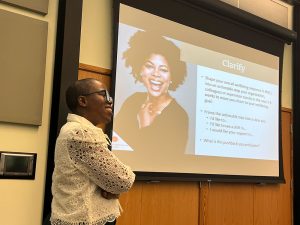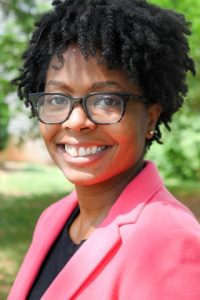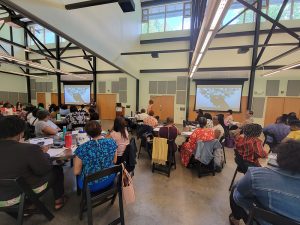Kimalee Dickerson documents how women of color working in public service face a unique set of personal and professional circumstances.

Kimalee Dickerson was excited and slightly overwhelmed when she had to create a waiting list for last summer’s Engaging Women of Color (EWC) conference.
“We started with 40 people signed up, then it grew to 60, and then we had to cap it at 80 attendees because that’s all the space we had at our venue,” says Dickerson, assistant professor of public leadership in the School of Government (SOG).
The June 2023 one-day gathering at the North Carolina Botanical Garden was the third iteration of the event. It was started in 2019 by SOG faculty as a way for women of color (WOC) working in public service, primarily local and state government in North Carolina, to connect and share their experiences. Due to the COVID-19 pandemic, 2020’s conference was held online, and momentum to plan another event halted.
But the connections made during the first two EWC events continued to grow. Attendees formed a group that has been meeting on their own for years. These women support each other as they navigate positions that are meaningful for themselves and the communities they represent.
“It’s important to have diverse representation in public service that includes different experiences and perspectives in the operations that are meant to serve everyone,” Dickerson says. “A young person of color should be able to walk into a local government space and see someone who looks like them.”
And while representation is important for equity, Dickerson believes the toll it can take on those representatives isn’t fully understood — something she’s now exploring with help from the ladies of EWC.

A natural fit
Dickerson came to UNC-Chapel Hill in September 2021 to pursue her interests in equity and the public sector.
“I’ve always been public service- and equity-minded,” Dickerson says. “It stems from values that I hold deeply and recognizing the role that public institutions have had historically.”
Dickerson’s attention was quickly captured by the EWC group, which after two conferences and many Zoom meetings of their own, voiced a desire to work with SOG on sharing their experiences more broadly.
“That sounded like research to me, and that was the beginning of my relationship with these women,” she says.
Dickerson started attending virtual meetings with the group while looking for existing research on the experiences of WOC, specifically women who identify as African American or Black, working in local government spaces. She didn’t find much. There aren’t many studies that explore this subject matter.
So Dickerson started her own study, using focus groups to systematically gather insight into what public service is like for WOC.
Space to share
Using the EWC group as a starting point, Dickerson began searching for study participants. In November 2022, she enlisted 38 WOC working in various local and state government positions throughout North Carolina.
The participants were divided into seven focus groups, and each met once via Zoom for an hour.
“One of the most powerful things about a focus group is that it can really create a sense of community,” Dickerson says. “It provides a space for people to talk about things they may not talk about often and gives the researcher an opportunity to gain a deeper understanding of their experiences through conversation.”
Dickerson learned how these women felt about the roles they play in departments ranging from human resources to law enforcement to city management. Themes developed in their conversations, like being a mediator for their community and providing access to services and information.
“This was a motivator for their work, and participants said they wanted to use their positions to create a better experience for communities that have been overlooked in the past,” she says.

Opposition and opportunity
In addition to motivation, Dickerson learned the pressure many of the women feel to not only succeed but pave a path for future generations.
“We asked study participants what it means to be a Black woman working in local government, and one person’s answer really summarized the overall experiences,” Dickerson says. She said it means “opposition and opportunity.”
In the focus groups, opposition was discussed as promotions or raises that were withheld, feeling the need to work harder to prove they deserved their position, and the anxiety and stress that accompanies both. Opportunity was identified as being leaders and role models, and holding the door open for people to follow behind them.
And there were topics that were considered both opportunity and opposition, like being the first Black woman to hold their position in an organization.
“Some of the women discussed having health issues related to the pressure they felt from their work and the responsibility of representing their communities. They’re exhausted,” Dickerson says.
These conversations inspired Dickerson to revive the EWC conference last summer with a focus on mental health and wellbeing, which was met with unprecedented interest. She’s now planning for the 2024 EWC conference on June 14, which will again be hosted at the North Carolina Botanical Garden, where they will work to accommodate as many attendees as possible.
In the meantime, Dickerson is sharing the information she collected from the focus groups. She wrote a chapter for a soon-to-be published book titled, “Women of Color and Hair Bias in the Work Environment,” presented her findings at the 2023 Conference of Minority Public Administrators, and is working to submit her study to public administration journals for publication.
“It’s been powerful to see the need and desire of WOC to be connected and have opportunities to network and learn together,” she says. “I look forward to my future work with these women and adding their experiences to the literature.”
Kimalee Dickerson is an assistant professor of public leadership in the UNC School of Government.